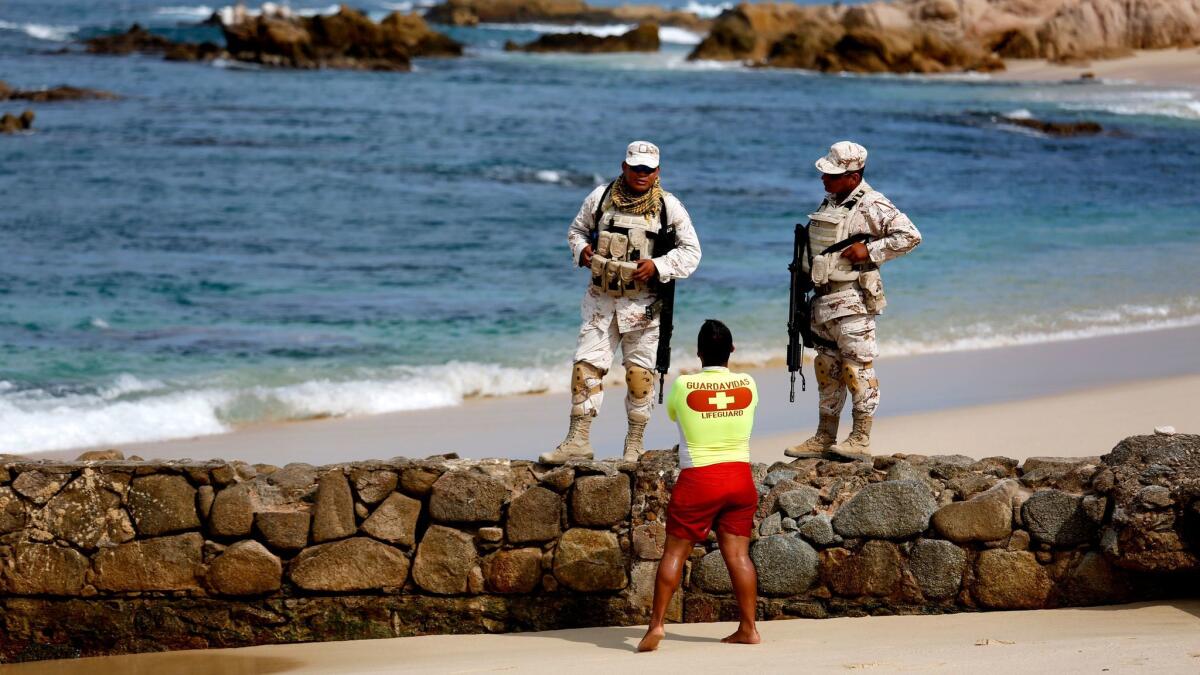Violence in Baja continues as six bodies are found on highway overpasses

Reporting from MEXICO CITY — The talk in the tourist haven of Los Cabos these days often focuses as much on escalating violence as on the anticipated influx of Christmas visitors.
The fast-rising homicide rate in the Mexican state of Baja California Sur has been making headlines for months, as rival criminal gangs battle it out for lucrative drug-smuggling corridors to the United States.
Officials have said that the reports have not damaged tourism, the region’s economic lifeblood. The violence has been concentrated among warring gang factions and has largely spared foreign visitors.
But this week brought another shock: The grisly discovery in the predawn hours Wednesday of the bodies of four men dangling from highway overpasses. The corpses of two other men were found tossed on the pavement of overpasses, authorities said.
Photographs of victims slung from highway bridges in Mexico became a trademark image in border areas like Ciudad Juarez, across the Rio Grande from El Paso. Authorities view the actions as brutal warnings from one faction to another in the country’s drug wars.
But the emergence of a similar phenomenon in Baja California Sur has sent a new chill through a region where many are worried that the chaos of criminal violence may well be deepening, with a possible negative effect on tourism.
Four of the six bodies were found on bridges along roads leading to the airports at La Paz and Los Cabos, key entry points for foreign visitors.
“Here everyone is worried about the violence,” Armando Diaz, 28, a waiter, said via telephone from San Jose del Cabo, one of the state’s twin signature beach resorts, along with Cabo San Lucas. “We as Mexicans are accustomed to hearing about the violence, but people found hanging from bridges here? That scares us. Imagine what the foreigners think. I could understand it if they see the news and decide not to come.”
Despite the official pronouncements that the rising violence has not discouraged tourism, many here wonder whether the incidents may be prompting some visitors to seek out safer holiday destinations.
“Of course the insecurity and violence affect us,” Gabriel Quintero, 42, who runs El Coral restaurant in San Jose del Cabo, said via telephone. “The government and the tourist associations tell us everything is fine ... but we have seen a reduction in the numbers of visitors. A year ago we had a lot more people.”
Officials in Baja California Sur said they have stepped up security, bolstered police patrols and are planning a new military marine base in response to the violence.
Although none of the recent violence has explicitly targeted tourists, the U.S. State Department in August warned Americans to take extra precautions when visiting Los Cabos.
The great fear in Los Cabos is that the region could suffer a fate like that of Acapulco, the storied Pacific resort that has become a battle zone for warring drug factions. The violence there has steered many foreigners away.
By Friday, Mexican authorities had yet to identify publicly the six men found dead on bridges this week. None suffered from gunshot wounds, authorities said, without elaborating on the causes of death. The cases were still under investigation, authorities said.
In at least two of the cases, the apparent killers also strung obscenity-laced banners from bridges, warning in one sign that they held the “power” in the region.
The six killings were the latest in a grim toll for Baja California Sur.
Between January and October, investigators opened 409 homicide investigations in the state, more than double the previous year’s total. During the same period in 2016, police in Baja California Sur investigated 147 homicides.
In November gunmen in the Baja California Sur state capital of La Paz fired on a vehicle carrying Silvestre de la Toba Camacho, president of the state human rights commission. He and his 20-year-old son were killed, and his wife and daughter were seriously injured.
UPDATES:
3:45 p.m.: This article has been updated throughout with background on crime in Baja California Sur and with comments from Gabriel Quintero and Armando Diaz.
This article was originally published at 12:40 p.m.
More to Read
Sign up for Essential California
The most important California stories and recommendations in your inbox every morning.
You may occasionally receive promotional content from the Los Angeles Times.









